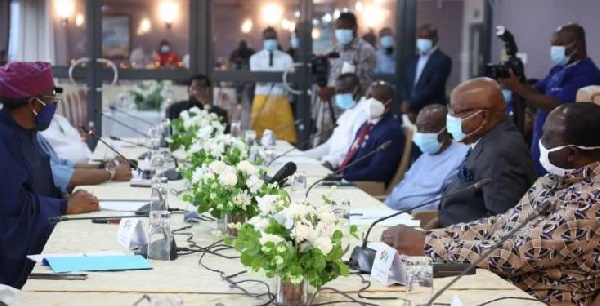There are no products in your shopping cart.
| 0 Items | £0.00 |


GHANA and Nigeria have been locked in intense negotiations in Abuja over the ongoing diplomatic spat brought about by the recent decision by the Ghanaian authorities to levy Nigerian traders operating in the country a hefty sum of $1m.
Across the major markets in most Ghanaian cities, Nigerian traders dominate the retail trade, squeezing local operators out. This created a bitter backlash, forcing local traders to approach the authorities for help, who responded ruthlessly by imposing a $1m duty on all Nigerian traders and have closed the shops of those who have refused to pay.
Over recent weeks, the issue has led to s diplomatic stand-off with Ghana being accused of breaching the Economic Community of West African States (Ecowas) free trade protocol. In search of a solution to the crisis, officials from both countries began talks in Abuja yesterday, with Hon Femi Gbajabiamila, the speaker of Nigeria's Federal House of Representatives calling on the Ghanaian authorities to review their position.
Ferdinard Nwonye, a spokesman for Nigeria's foreign ministry, said: “The ministry of foreign affairs wishes to inform that a delegation of senior Ghanaian government officials led by Hon Allan John Kyeremanteng, the minister for trade and industry, arrived Abuja on Thursday, 3rd September 2020 to hold a discussion with their Nigerian counterparts. Other members of the Ghanaian delegation include Hon Kojo Oppong Nkrumah, minister for information and Hon Mohammed Habibu Tijani, the deputy minister for foreign affairs and regional integration.”
Nigeria's delegation to the meeting was led by the minister of industry, trade and investment, Chief Adeniyi Adebayo. Others members of the delegation were the minister of information and culture, Alhaji Lai Mohammed and the minister of state for foreign affairs, Ambassador Zubairu Dada.
Hon Gbajabiamila, who recently visited Ghana on a two-day mission to review the situation, urged the Ghanaian authorities to revisit the law, saying as Africans, the country should encourage brotherliness. At a meeting with Ghanaian lawmakers and some top government officials, he advocated an amicable settlement of trade disputes through arbitration and fair judicial processes.
He said he would be glad to champion a law to improve the bilateral trade relations between Nigeria and Ghana. Hon Gbajabiamila said Nigeria and its people are worried by the challenges that Nigerian traders face in Ghana and called for an urgent action to end the hostilities.
Hon Gbajabiamila said: "We do believe that while it is the sovereign right of the government of Ghana to pass and implement the GIPC Act, we would implore you to explore alternative and less aggressive options of engaging, sanctioning and relating with our traders and business people who operate in your country, pay taxes and contribute to the development of both our nations. Secondly, we would encourage you to revisit the component of the law that requires a capital base of $1,000,000.
We are all Africans; we all have towns and villages and we know only too well that majority of our traders across the continent are petty traders. The prospect of them being able to raise a capital base of $1,000,000 before they can trade in goods that may be worth less than $1,000, clearly is a major challenge.
“Thirdly, one of the things we are all proud about and the common surname that we all bear is Ecowas and as you know, by the virtue of being Ecowas countries, our nations and our citizens should be able to live, work and thrive in any of our nations without any form of hindrance or discrimination. It is in this light we would encourage that we explore how the principles and the application of Ecowas protocols, which we are both signatories to may perhaps conflict with the application of the GIPC Act, especially vis-à-vis the recent adoption of the African Continental Free Trade Agreement."
Hon Alan Kyeremateng, the Ghanaian minister of trade and industry, said there are many Ghanaians and Nigerians who are going about their lawful duties without difficulties. He added that the incidences of some shops being locked up must have arisen out of situations where there were clear abuses of the application of the laws.
"I was happy that the Nigerian speaker of the House of Representatives mentioned that if they are doing legitimate business, please allow them as brothers and sisters to continue to do so. I want to give you that assurance that that will be the case and anybody engaged in business, trading, doing the rightful things, they must have no difficulties,” Hon Kyeremateng added.